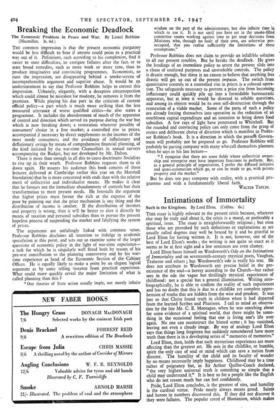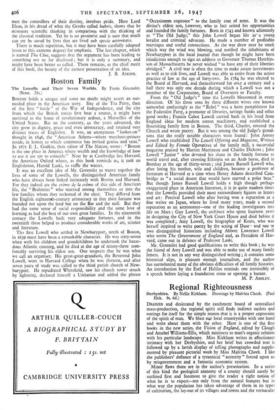Intimations of Immortality
Such is the Kingdom. By Lord Elton. (Collins. 6s.) THIS essay is highly relevant to the present crisis because, whatever else may be truly said about it, the crisis is a moral, or preferably a spiritual, issue. The essay is straightforwardly religious ; but even those who are provoked by such definitions or explanations. as are usually called dogmas may well be braced by it and be grateful to Lord Elton for having written it. It is not, however, one of the best of Lord Elton's works ; the writing is not quite so exact as it seems to be at first sight and a few sentences are even clumsy.
Lord Elton bases himself on Wordsworth's Ode on the Intimations of Immortality and on seventeenth-century mystical poets, Vaughan, Traheme and others ; but Wordsworth's ode is really his text. He does not attribute to Wordsworth any precise belief in the pre- existence of the soul—a heresy according to the Church—but rather sees in the ode the vague but thrillingly mystical experiences of childhood: not a special but a general illumination. Writing auto- biographically, he is able to confirm the reality of such experiences and has no doubt that this is due to a childlike yet complete appre- hension of truths that are hidden from the wise and prudent. It was just so that Christ found truth in children when it had departed from the learned Scribes and Pharisees. I call to mind an observa- tion by the late Mr. C. E. Montague, when he was searching about for some evidence of a spiritual world, that there might be some- thing in the occasional feeling that one is living one's life over again. No one can reconstruct the hinted scene • it has vanished, leaving not even a cloudy image. By way of analogy Lord Elton says that things long forgotten but suddenly remembered have more truth than there is in a developing series of memories of memories."
Lord Elton, then, holds that such mysterious experiences are more affecting than the greatest art. He sees in the childlike, or humble, spirit the only cast of soul or mind which can save a nation from disaster. The humility of the child and its faculty of wonder by no means necessarily imply happiness. Childhood may be a time rather of poignancy but, as Sir Arthur Quiller-Couch declared, " the very highest universal truth is something so simple that a child may understand it" It is best so for a people like the English who do not reason much but can feel confidently.
Pride, Lord Elton concludes, is the greatest of sins, and humility is the cardinal virtue. Pride nearly always means greed. Saints and heroes in numbers discovered this. If they did not discover It they were failures. The popular creed of Humanism, which makes men the controllers of their destiny, involves pride. Here Lord Elton, in his dread of what the Greeks called hubris, shows that he mistrusts scientific thinking in comparison with the thinking of the classical tradition. Yet he is no pessimist and is sure that much can yet be saved by lives that are lived sub specie aeterritatis.
There is much repetition, but it may have been carefully adopted (even to this extreme degree) for emphasis. The last chapter, which is named The Clue, suggests that the argument has been leading to something not so far disclosed ; but it is only a summary, and might have been better so called. There remains, as the chief merit of this book, the beauty of the earnest presentation of an idea.
J. B. ATKINS.



































 Previous page
Previous page